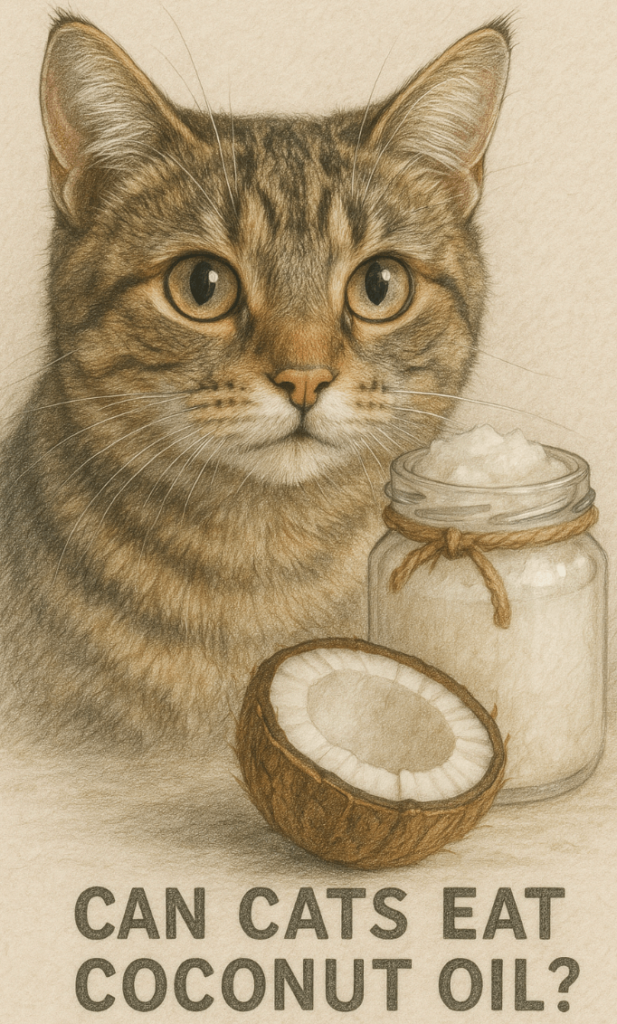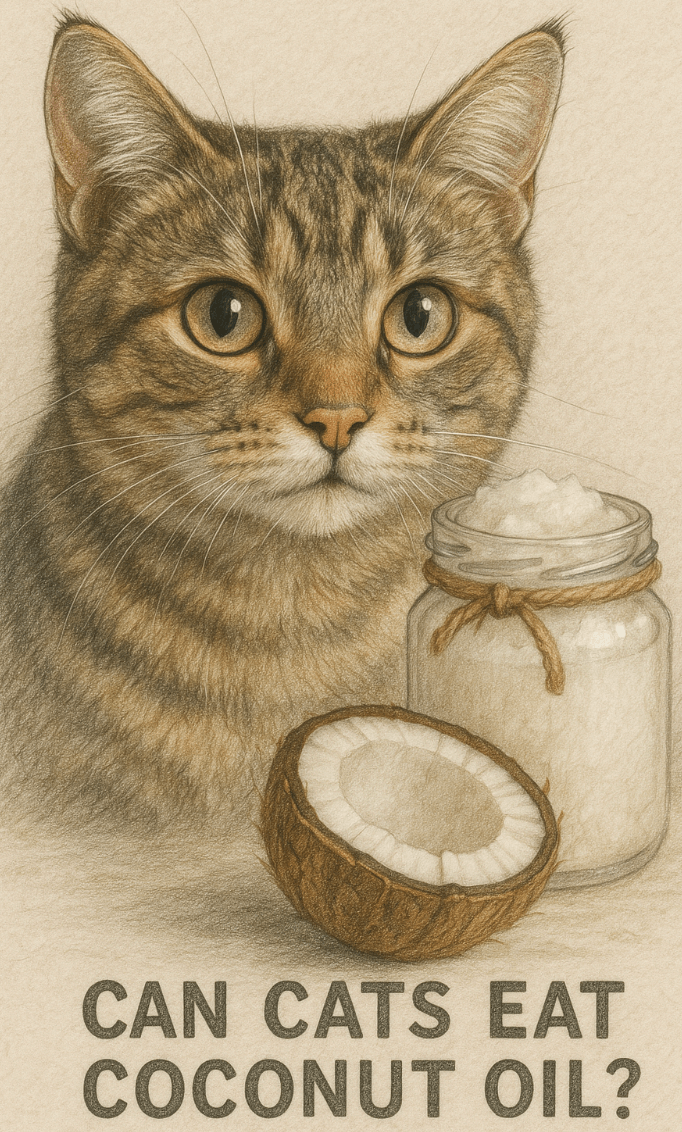Can Cats Eat Coconut Oil?
Coconut oil has gained popularity as a natural remedy for humans and pets alike, touted for its potential health benefits. But what about cats? Many pet owners wonder whether coconut oil is safe or even beneficial for their feline companions. While some claim it can support skin health, digestion, and overall wellness, others caution against introducing it into a cat’s diet without proper guidance. Understanding the facts about coconut oil and its effects on cats is essential before deciding to include it in their routine. In this blog post, we’ll explore the potential benefits, risks, and best practices for using coconut oil with your cat.
Potential Benefits of Coconut Oil for Cats
When used correctly, coconut oil may offer several advantages for your cat’s health. However, it’s important to approach these claims with moderation and veterinary advice. Here are some potential benefits of incorporating coconut oil into your cat’s care routine.
Supports Skin and Coat Health:
The fatty acids in coconut oil can moisturize dry skin and promote a shiny, healthy coat, especially in cats with dermatological issues.Aids Digestive Health:
Coconut oil contains medium-chain triglycerides (MCTs), which may help improve digestion and alleviate symptoms of mild gastrointestinal upset.Natural Antimicrobial Properties:
Lauric acid, a key component of coconut oil, has antimicrobial properties that may help combat certain infections or parasites.Reduces Hairball Formation:
By lubricating the digestive tract, coconut oil may help reduce hairball frequency in cats prone to grooming-related issues.Boosts Immune Function:
Some studies suggest that coconut oil’s antioxidants and fatty acids can support a stronger immune system in cats.
While these benefits sound promising, it’s crucial to introduce coconut oil gradually and monitor your cat’s response to avoid adverse effects.
Risks and Considerations When Feeding Coconut Oil to Cats
Despite its potential benefits, coconut oil isn’t suitable for every cat. There are risks and considerations to keep in mind before adding it to their diet.
High Fat Content:
Coconut oil is calorie-dense and high in fat, which can lead to weight gain or obesity if overfed.Digestive Upset:
Some cats may experience diarrhea, vomiting, or stomach discomfort when introduced to coconut oil too quickly.Allergic Reactions:
Although rare, some cats may develop allergic reactions such as itching, swelling, or respiratory issues after consuming coconut oil.Interference with Medications:
Coconut oil may interact with certain medications, particularly those metabolized by the liver. Always consult your vet first.Not a Substitute for Veterinary Care:
Coconut oil should complement—not replace—professional treatment for any underlying health conditions.
Understanding these risks ensures you use coconut oil responsibly and prioritize your cat’s well-being.
Check this guide 👉Can Cats Eat Cantaloupe? Best 7 Expert Tips!
Check this guide 👉Can Cats Eat Basil? Best 7 Expert Tips!
Check this guide 👉Can Cats Eat Onions? Best 7 Expert Tips!

Benefits of Coconut Oil for Cats | Risks of Using Coconut Oil for Cats |
|---|---|
Moisturizes dry skin and improves coat | Can cause digestive upset if overused |
May reduce hairball formation | High calorie content can lead to weight gain |
Supports immune system function | Potential allergic reactions in sensitive cats |
Natural antimicrobial properties | May interfere with certain medications |
Aids mild digestive issues | Not a substitute for professional treatment |
How to Safely Introduce Coconut Oil to Your Cat
If you decide to try coconut oil for your cat, it’s essential to do so cautiously to avoid overwhelming their system. Follow these guidelines for a smooth introduction.
Start with Small Amounts:
Begin with a tiny dose, such as 1/4 teaspoon for small cats or 1/2 teaspoon for larger breeds, once or twice a week.Monitor for Adverse Reactions:
Watch for signs of digestive upset, allergies, or behavioral changes after feeding coconut oil.Mix with Food:
Blend coconut oil into your cat’s regular food to mask the taste and make it more palatable.Choose Virgin or Unrefined Coconut Oil:
Opt for high-quality, organic virgin coconut oil free from additives or harmful chemicals.Consult Your Veterinarian First:
Always seek professional advice before introducing new supplements, especially if your cat has pre-existing health conditions.
By following these steps, you can minimize risks while exploring the potential benefits of coconut oil for your cat.
Alternative Uses of Coconut Oil for Cats
Beyond dietary supplementation, coconut oil has other practical applications for improving your cat’s well-being. These uses focus on external care rather than ingestion.
Topical Application for Skin Issues:
Rub a small amount of coconut oil onto dry or irritated skin to soothe irritation and promote healing.Cleaning Ears Safely:
Mix coconut oil with water to gently clean your cat’s ears, helping to remove dirt and wax buildup.Detangling Fur:
Apply a small dab of coconut oil to matted fur to loosen tangles and make grooming easier.Repelling Pests Naturally:
Coconut oil’s scent can act as a mild deterrent for fleas and ticks, though it shouldn’t replace traditional pest control methods.Massaging Joints:
For senior cats with arthritis, massaging diluted coconut oil into sore joints may provide temporary relief.
These alternative uses demonstrate the versatility of coconut oil in enhancing your cat’s comfort and hygiene.
Common Misconceptions About Coconut Oil for Cats
There are several myths surrounding the use of coconut oil for cats. Clearing up these misconceptions helps ensure safe and effective usage.
Coconut Oil Is a Cure-All:
While beneficial in some cases, coconut oil isn’t a miracle cure for all feline health issues.All Cats Love the Taste:
Many cats dislike the flavor of coconut oil, making it challenging to incorporate into their diet.It’s Safe in Any Amount:
Overfeeding coconut oil can lead to obesity and digestive problems, so portion control is critical.It Replaces Professional Treatment:
Coconut oil should never replace veterinary care for serious medical conditions.It Works Immediately:
Results from using coconut oil may take time, and patience is necessary to see improvements.
Understanding these truths helps set realistic expectations for coconut oil’s role in your cat’s care.
Signs Your Cat May Benefit from Coconut Oil
Certain behaviors or health issues might indicate that your cat could benefit from coconut oil. Look for these signs before considering its use.
Dry or Flaky Skin:
Persistent scratching or visible dandruff may signal the need for added moisture from coconut oil.Excessive Grooming Leading to Hairballs:
Frequent hairball regurgitation could be alleviated with coconut oil’s lubricating properties.Dull or Brittle Coat:
A lackluster coat may improve with the nourishing effects of coconut oil’s fatty acids.Mild Digestive Upset:
Occasional constipation or diarrhea might respond positively to small amounts of coconut oil.Recurrent Skin Infections:
Coconut oil’s antimicrobial properties may help manage minor skin infections or irritations.
Recognizing these signs can guide you in determining whether coconut oil is worth trying for your cat.
Tips for Storing and Handling Coconut Oil Around Cats
Proper storage and handling of coconut oil ensure safety and maintain its quality for both you and your cat. Follow these tips for hassle-free use.
Store in a Cool, Dark Place:
Keep coconut oil away from direct sunlight or heat sources to prevent spoilage.Use Separate Utensils:
Avoid cross-contamination by using dedicated spoons or tools for your cat’s portion.Keep Out of Reach:
Store coconut oil securely to prevent curious cats from accessing large quantities unsupervised.Check for Freshness Regularly:
Discard coconut oil if it smells rancid or shows signs of spoilage to avoid harming your cat.Introduce Gradually to Prevent Waste:
Start with small amounts to gauge your cat’s acceptance and avoid wasting unused portions.
These practices ensure safe and efficient use of coconut oil in your household.
Frequently Asked Questions About Coconut Oil for Cats
How much coconut oil can I give my cat?
Start with no more than 1/4 to 1/2 teaspoon per day, depending on your cat’s size, and adjust based on tolerance.
Can kittens eat coconut oil?
It’s best to avoid giving coconut oil to kittens unless specifically recommended by a veterinarian.
Is coconut oil safe for cats with allergies?
Cats with known food sensitivities should avoid coconut oil unless approved by a vet.
Can coconut oil cure hairballs?
While it may help reduce hairball frequency, it’s not a guaranteed solution for severe cases.
What if my cat doesn’t like the taste?
If your cat refuses coconut oil, don’t force it—there are other ways to address their health needs.
Making Informed Choices About Coconut Oil for Your Cat
Coconut oil can be a helpful addition to your cat’s care routine when used responsibly and in moderation. While it offers potential benefits like improved skin health and digestion, it also carries risks such as digestive upset and weight gain. By consulting your veterinarian, starting small, and monitoring your cat’s response, you can determine whether coconut oil is right for your furry friend. Remember, every cat is unique, and what works for one may not suit another. Prioritize your cat’s individual needs, and always err on the side of caution when introducing new supplements or treatments.
Pemphigus Erythematosus in Cats: Best 7 Expert Tips! – Learn to recognize symptoms, manage flare-ups, and improve your cat’s quality of life.
Pemphigus Erythematosus in Dogs: Best 7 Expert Tips! – Discover causes, symptoms, and treatment options to manage this autoimmune skin condition effectively.
Cat Tympanic Membrane: Best 7 Expert Tips! – Learn how to protect your cat’s eardrum, spot issues early, and ensure lifelong auditory health.
Dog Tympanic Membrane: Best 7 Expert Tips! – Learn how to protect your dog’s eardrum, spot issues early, and ensure lifelong ear health with expert advice.





